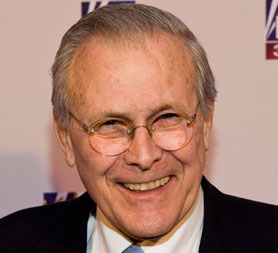The unknown knowns of Donald Rumsfeld
Regrets? Former US Defence Secretary Donald Rumsfeld has a few – but not that many – if the first interview about his new book is anything to go by, writes Felicity Spector.

Donald Rumsfeld sat down with ABC’s Diane Sawyer, to mark the publication of his memoirs – Known and Unknown – spanning his decades in public office, including two stints as Secretary of Defence – as first the youngest and then the oldest man to hold the post.
Most of the book, as you might expect, is a robust defence of the NeoCon philosophy and the decisions he took. As he puts it: “I don’t spend a lot of time in recriminations, looking back or second-guessing decisions made in real time with imperfect information…”
There is, however, a fair bit of blame for some of his erstwhile colleagues – namely former Secretary of State Colin Powell, who he describes as a bad manager, and the former National Security Adviser Condoleezza Rice, who’s dismissed as “inexperienced and ineffectual”. Even President Bush doesn’t emerge without criticism, despite Rumsfeld’s fierce loyalty – he’s portrayed as a poor decision-maker, who failed to see his orders successfully carried through.
The journalist Gwen Ifill, in the Washington Post, describes the book thus: “At its heart, it is a revenge memoir”, while “Rumsfeld, according to Rumsfeld, was prescient, clear-headed, loyal and almost always right.”
Biggest mistake
But it turns out Mr Rumsfeld does have the odd regret after all – telling Ms Sawyer that the book reveals he believes that his biggest mistake in office was not resigning in the wake of the Abu Ghraib prisoner abuse scandal. He said he’d tried to step down after the photographs of abused Iraqi detainees caused outcry around the world – but President Bush had persuaded him to stay on.
And although he defended the harsh interrogation techniques used on some of the Guantanamo inmates, including Mohamed al-Qahtani – the 20th hijacker involved in the 9/11 attacks – he did admit that some went further than they should have done. But he denied that anything he’d authorised amounted to torture – saying he’d ordered all detainees to be treated humanely. And he insisted that once he’d found out about it, those responsible were stopped and prosecuted.
He also conceded it was “possible” that cutting troop levels in Iraq had been a big mistake – this after President Bush called the decision “the most important failure in the execution of the war”.
Could’a, would’a, should’a. On such mis-statements, invasions are launched.
But what of the judgement that many consider the most important failure of all – the insistence that Iraq had sites containing weapons of mass destruction in Baghdad and Tikrit? That, says Rumsfeld, was a “mis-statement”. Turns out he should’ve said “suspect sites”.
Could’a, would’a, should’a. On such mis-statements, invasions are launched.
The 800-page memoir is published today. As well as the military stuff, you can read about Mr Rumsfeld’s less than romantic marriage proposal (“There was little build up, little suspense, and at ten o clock in the morning, it wasn’t very romantic”, if you must know) and his various encounters with the media, from the ’60s onwards.
In the end, though, Known and Unknown is very definitely the authorised Rumsfeld version – more rectitude than recrimination. As Howard Kurtz wrote in The Daily Beast: “What is known is that he has in these 50 chapters marshalled his best defence: only history’s final verdict remains unknown.”
-
Latest news
-
Taylor Swift’s new break-up album breaks records3m

-
NHS trust fined £200K for failings that led to death of two mental health patients3m

-
Sunak vows to end UK ‘sick note culture’ with benefit reform3m

-
‘Loose talk about using nuclear weapons is irresponsible and unacceptable’, says head of UN’s nuclear watchdog3m

-
‘There wasn’t an Israeli attack on Iran,’ says former adviser to Iran’s nuclear negotiations team7m

-




